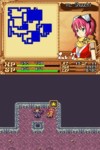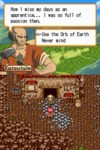Izuna: Legend of the Unemployed Ninja is a pseudo-action dungeon crawler for the DS that bends a lot of the traditional trappings of the genre.
The basic premise of Izuna is that the main character, whom the game is named after, is unemployed due to the fact that the world she is in has no conflicts. As a ninja in a time of peace, she got the boot. Izuna travels to a town with her sister, Shino, her slave, Mitsumoto, and her grandboss. Izuna, in a very short time, manages to anger the gods, and they subsequently curse the town. She now must lift the curse.
The story seems like a slight twist of the standard RPG narrative, and it is, but unfortunately this slight twist is pretty much the only thing that the story does. Nothing happens. Essentially, players are trapped fighting in eight dungeons, and that is pretty much what happens. Thankfully, the dialogue in the game is superb, and the characters are each fresh and unique. Mitsumoto is probably the character that stands out the most. As Izuna's slave, he is constantly harassed by her. The expressions, shown in the text boxes, as he talks, are utterly hilarious, not to mention his responses. He is also girl crazy and this leads to many fights between him and Izuna. This is just one example of the great characterization in the game. The dialogue, superb characters, and great humor make up a little for the extremely dull story, but it doesn't excuse it.
 |
| Get really used to seeing this dungeon screen, and others like it... lots of others. |
The dungeons themselves are where players will find themselves spending most of the time in Izuna. Unfortunately, they are even less enjoyable than the dull plot. While the game takes some traditional elements and twists them, these changes are mostly just frustrating and nowhere near enjoyable.
Upon entering a dungeon, players must guide Izuna to a set of stairs to continue to the next floor to continue. On the way, they will see items lying around on the floor. Players can simply step on them to pick them up. These items range from weapons to Talismans that allow Izuna to cast magic. Players should not get attached to any of these items or weapons, as they will really need to get used to losing them, a lot. One can lose all items in his/her possession by: dying, turning off the game in a dungeon or town, saving and turning off the game, basically doing anything other than beating the dungeon, going back to town, going to the storehouse, and storing the items manually. (And these are just off the top of my head.) It is an extreme hassle. Players can attach items to their weapons to send them to the storehouse if they save or die, but it is extremely
frustrating to constantly lose many hard-earned items. Not only that, but the game automatically saves whenever the player dies, therefore making item loss absolutely permanent. There are simply not enough ways to hold on to important items in this game, because even once they are in the storehouse, players still need to use them, and by using them, they constantly take the risk of losing them through death.
Not only that, but the game is extremely hard. While some players will enjoy the massive challenge of the game, the high difficulty combined with constant loss of items leads to frustration.
The dungeons themselves are navigated by moving Izuna around the dungeon. Enemies don't move unless Izuna does, so it's crucial to utilize the D-pad to move only the necessary amount, unless players are trying to fight as much as possible. The fights themselves seem sort of real time, but are turn based. Each movement or action by Izuna prompts a movement or action by the enemy. It is important to utilize bottlenecks to cut down on the amount of enemies Izuna has to fight at a time, because if there are three enemies within striking distance of Izuna, all three will attack if she moves. Also, many of the enemies, and especially the gods themselves, are very, very powerful. Many of the normal enemies can kill Izuna in around three hits, especially when first entering a new dungeon. The use of items to heal is very important, but as stated before, holding onto
any items, let alone healing items, is a major pain. Another thing to take into account is the extreme lengths of time some of the dungeons take to complete. The first dungeon is 5 floors, but later dungeons are 20, then 40, then even more floors. This can get extremely boring and monotonous, and just seems like a lot of filler space.
The talismans are used for magic are also used for upgrading weapons. A lot of these talismans are useful, but must be used conservatively by players, lest they break. This talisman system is pretty interesting, but unfortunately is also affected by the high loss-of-items rate.
 |
| Yes, yes you were. *Gives knowing look* |
The sound effects and music are both average, but nothing more. There is nothing that is extremely bad, but nothing noteworthy either. The graphics, however, are pretty bad. They have some nostalgic feel to them, but just feel low quality throughout, especially in the many repetitive floors of dungeons.
Izuna: Legend of the Unemployed Ninja tragically falls victim to its own design. It really has some interesting things going for it, by the overall amount of frustration players will feel throughout the game really takes away from the quality of the game. It can only be recommended to the most hardcore dungeon-crawl fans, as a gigantic amount of time will have to be spent walking through tons of randomly generated floors fighting off enemies with virtually no storyline. While the characters are all interesting, they are not seen enough in the game. Izuna: Legend of the Unemployed Ninja is a game with a few good qualities that is tainted by many bad ones.